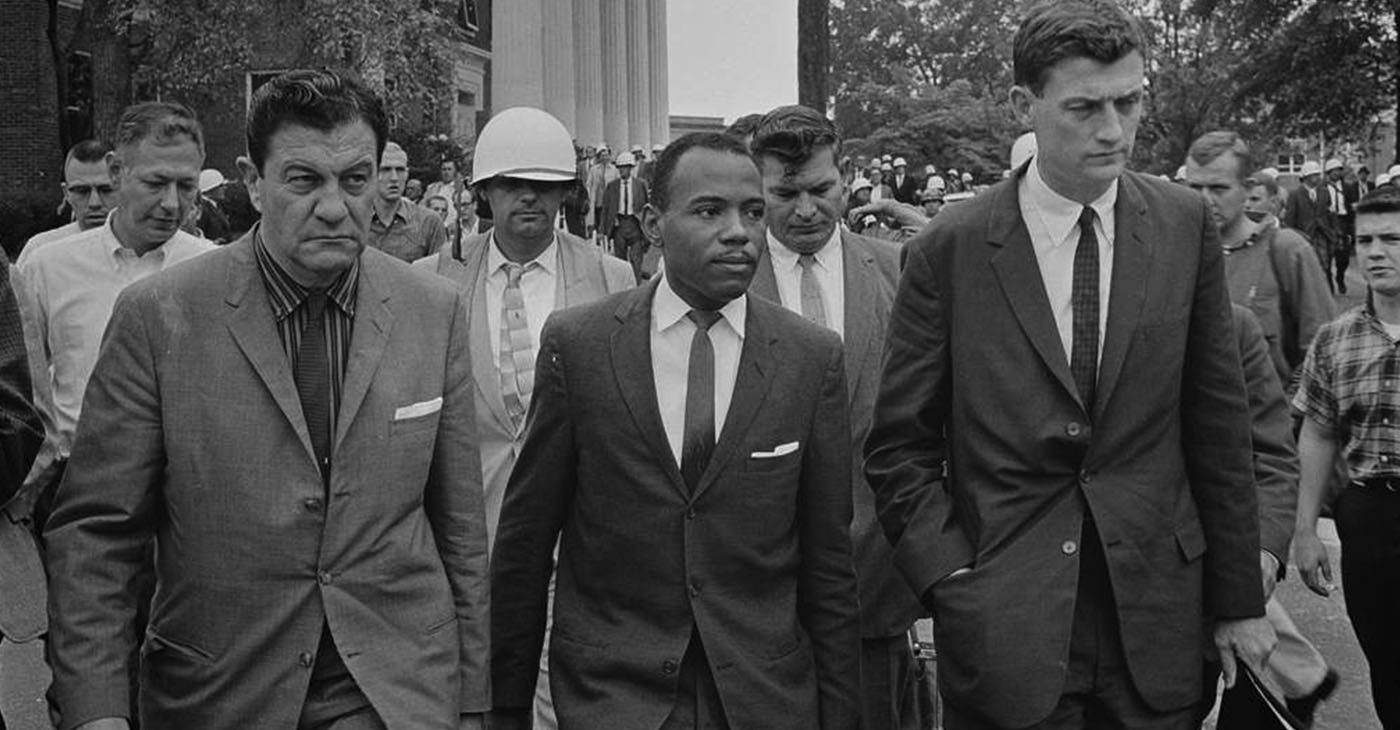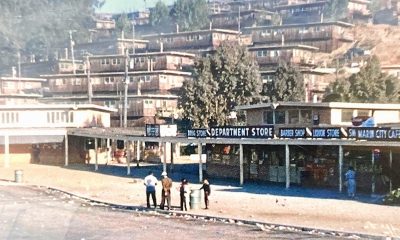Activism
March Against Fear: When ‘Black Power’ Became Mainstream
What began as a solitary peaceful protest for voter registration became one of the South’s most important demonstrations of the civil rights movement. Leaders like Martin Luther King, Jr. and Carmichael formed unlikely alliances that resulted in the Black Power movement. This ushered in a new era in the fight for equality.

By Tamara Shiloh
It was June 5, 1966.
James Howard Meredith (born 1933), on a mission to encourage Black voter registration and defy entrenched racism in the South, set out on a solitary walk from Memphis, Tennessee to Jackson, Mississippi.
On the second day of his journey, Aubrey Norvell, a white gunman, waited on a roadside a few miles south of Hernando, Mississippi. He ambushed Meredith, shooting him in the neck, head, and back.
Within 24 hours, the nation’s three principal civil rights organizations vowed to continue the march: the Southern Christian Leadership Conference, the Congress of Racial Equality, and the Student Nonviolent Coordinating Committee.
Success of the event could not be predicted. Leaders were aware that last-minute planning of a march could be dangerous, and the route chosen was not without uncertainty. The three-week march led to death threats, arrests, and the use of tear gas. Internal tensions surrounding leadership swelled and use of the slogan “Black Power” became a revolutionary phrase urging self-determination and Black pride.
The Deacons for Defense and Justice, a group of Black veterans from World War II who believed in armed self-defense, provided protection for participants. Founded in Jonesboro, La., in 1964, The Deacons for Defense had already protected civil rights activists from the Ku Klux Klan. About 20 chapters were created throughout Louisiana, Mississippi, and Alabama.
The march ended on June 22, 1966. Meredith, sufficiently recovered, had been able to rejoin the event. Participants supporting Meredith along the way joined in, making the total number of marchers arriving in Jackson about 15,000. The March Against Fear was one of the largest marches in history for that geographical area. It was during the post-march rally that Stokely Carmichael first used the phrase “we want Black Power” during a public speech.
Carmichael sought to define the quest for Black Power in constructive terms, explaining to supporters in Detroit that “Black votes created Black Power…That doesn’t mean that we are anti-white. We are just developing Black pride.”
Meredith had become well known when he successfully challenged the Kennedy administration to protect his civil rights. His application for admission to the University of Mississippi, dubbed Ole Miss, had been twice denied. With backing from the NAACP, he filed suit for racial discrimination.
After heavy negotiations with U.S. Attorney General Robert Kennedy, Meredith was permitted to enroll at Ole Miss but only under escort of federal troops. He graduated in 1963 with a bachelor’s degree in political science.
What began as a solitary peaceful protest for voter registration became one of the South’s most important demonstrations of the civil rights movement. Leaders like Martin Luther King, Jr. and Carmichael formed unlikely alliances that resulted in the Black Power movement. This ushered in a new era in the fight for equality.
Understand the complex issues of fear, injustice, and the challenges of change in Anne Bausum’s “The March Against Fear: The Last Great Walk of the Civil Rights Movement and the Emergence of Black Power.”
Activism
Oakland Post: Week of April 17 – 23, 2024
The printed Weekly Edition of the Oakland Post: Week of April 17 – 23, 2024

To enlarge your view of this issue, use the slider, magnifying glass icon or full page icon in the lower right corner of the browser window. ![]()
Activism
Oakland Schools Honor Fred Korematsu Day of Civil Liberties
Every Jan. 30, OUSD commemorates the legacy of Fred Korematsu, an Oakland native, a Castlemont High School graduate, and a national symbol of resistance, resilience, and justice. His defiant stand against racial injustice and his unwavering commitment to civil rights continue to inspire the local community and the nation. Tuesday was “Fred Korematsu Day of Civil Liberties and the Constitution” in the state of California and a growing number of states across the country.

By Post Staff
Every Jan. 30, OUSD commemorates the legacy of Fred Korematsu, an Oakland native, a Castlemont High School graduate, and a national symbol of resistance, resilience, and justice.
His defiant stand against racial injustice and his unwavering commitment to civil rights continue to inspire the local community and the nation. Tuesday was “Fred Korematsu Day of Civil Liberties and the Constitution” in the state of California and a growing number of states across the country.
One OUSD school is named in his honor: Fred T. Korematsu Discovery Academy (KDA) elementary in East Oakland.
Several years ago, founding KDA Principal Charles Wilson, in a video interview with anti-hate organization “Not In Our Town,” said, “We chose the name Fred Korematsu because we really felt like the attributes that he showed in his work are things that the children need to learn … that common people can stand up and make differences in a large number of people’s lives.”
Fred Korematsu was born in Oakland on Jan. 30, 1919. His parents ran a floral nursery business, and his upbringing in Oakland shaped his worldview. His belief in the importance of standing up for your rights and the rights of others, regardless of race or background, was the foundation for his activism against racial prejudice and for the rights of Japanese Americans during World War II.
At the start of the war, Korematsu was turned away from enlisting in the National Guard and the Coast Guard because of his race. He trained as a welder, working at the docks in Oakland, but was fired after the bombing of Pearl Harbor in 1941. Fear and prejudice led to federal Executive Order 9066, which forced more than 120,000 Japanese Americans out of their homes and neighborhoods and into remote internment camps.
The 23-year-old Korematsu resisted the order. He underwent cosmetic surgery and assumed a false identity, choosing freedom over unjust imprisonment. His later arrest and conviction sparked a legal battle that would challenge the foundation of civil liberties in America.
Korematsu’s fight culminated in the Supreme Court’s initial ruling against him in 1944. He spent years in a Utah internment camp with his family, followed by time living in Salt Lake City where he was dogged by racism.
In 1976, President Gerald Ford overturned Executive Order 9066. Seven years later, the 9th Circuit Court of Appeals in San Francisco vacated Korematsu’s conviction. He said in court, “I would like to see the government admit that they were wrong and do something about it so this will never happen again to any American citizen of any race, creed, or color.”
Korematsu’s dedication and determination established him as a national icon of civil rights and social justice. He advocated for justice with Rosa Parks. In 1998, President Bill Clinton gave him the Presidential Medal of Freedom saying, “In the long history of our country’s constant search for justice, some names of ordinary citizens stand for millions of souls … To that distinguished list, today we add the name of Fred Korematsu.”
After Sept. 11, 2001, Korematsu spoke out against hatred and discrimination, saying what happened to Japanese Americans should not happen to people of Middle Eastern descent.
Korematsu’s roots in Oakland and his education in OUSD are a source of great pride for the city, according to the school district. His most famous quote, which is on the Korematsu elementary school mural, is as relevant now as ever, “If you have the feeling that something is wrong, don’t be afraid to speak up.”
Activism
WOMEN IMPACTING THE CHURCH AND COMMUNITY
Juanita Matthews, better known as “Sister Teacher,” is a walking Bible scholar. She moved to California from the great state of Arkansas in 1971. Sister Teacher has a passion for teaching. She has been a member of Bible Fellowship Missionary Baptist Church since 1971.

Sister Juanita Matthews
55 Years with Oakland Public School District
The Teacher, Mother, Community Outreach Champion, And Child of God
Juanita Matthews, better known as “Sister Teacher,” is a walking Bible scholar. She moved to California from the great state of Arkansas in 1971. Sister Teacher has a passion for teaching. She has been a member of Bible Fellowship Missionary Baptist Church since 1971. She followed her passion for teaching, and in 1977 became the lead teacher for Adult Class #6. Her motto still today is “Once My Student, Always My Student”.
Beyond her remarkable love for the Lord, Sister Teacher has showcased her love for teaching by working for the Oakland Unified School District for 55 years, all but four of those years spent at Emerson Elementary and Child Development School. She truly cares about her students, making sure they have the tools/supplies needed to learn either at OUSD or Bible Fellowship Missionary Baptist Church.
She’s also had a “Clothes Closet Ministry” for 51 years, making sure her students have sufficient clothing for school. The Clothes Closet Ministry extends past her students, she has been clothing the community for over 50 years as well. She loves the Lord and is a servant on a mission. She is a loving mother to two beautiful children, Sandra and Andre. This is the impact this woman of God has on her church and the community.
-

 Activism4 weeks ago
Activism4 weeks agoOakland Post: Week of March 27 – April 2, 2024
-

 #NNPA BlackPress4 weeks ago
#NNPA BlackPress4 weeks agoCOMMENTARY: D.C. Crime Bill Fails to Address Root Causes of Violence and Incarceration
-

 #NNPA BlackPress4 weeks ago
#NNPA BlackPress4 weeks agoFrom Raids to Revelations: The Dark Turn in Sean ‘Diddy’ Combs’ Saga
-

 #NNPA BlackPress4 weeks ago
#NNPA BlackPress4 weeks agoCOMMENTARY: Lady Day and The Lights!
-

 #NNPA BlackPress4 weeks ago
#NNPA BlackPress4 weeks agoMayor, City Council President React to May 31 Closing of Birmingham-Southern College
-

 #NNPA BlackPress4 weeks ago
#NNPA BlackPress4 weeks agoBaltimore Key Bridge Catastrophe: A City’s Heartbreak and a Nation’s Alarm
-

 #NNPA BlackPress4 weeks ago
#NNPA BlackPress4 weeks agoBaltimore’s Key Bridge Struck by Ship, Collapses into Water
-

 #NNPA BlackPress4 weeks ago
#NNPA BlackPress4 weeks agoBeloved Actor and Activist Louis Cameron Gossett Jr. Dies at 87


















































